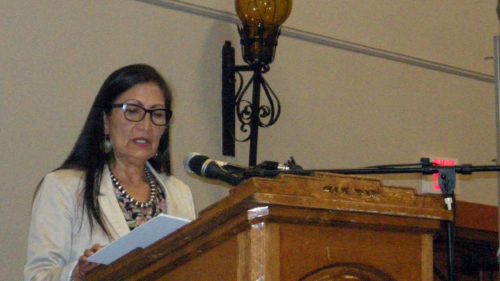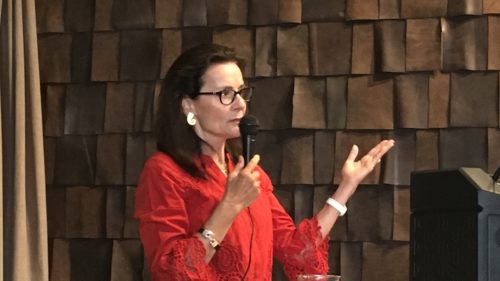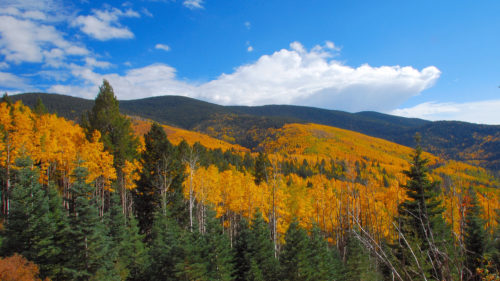The most recent game commission, held at Highlands University in Las Vegas, had a jam packed agenda. Of particular note was that we were happy to see a number of students attend the meeting to find out more about the process.
The meeting began with Commission Paul Kienzle, reading a letter from a Los Alamos attorney, praising the department for hosting a recent hunter education course that he attended with his son. The letter spoke to the staff, volunteers, and game warden’s professionalism and respect for the environment. He also noted the safe environment created by everyone running the education course, and thanked everyone putting on the lesson.
Mike Phillips from the Turner Endangered Species Foundation gave an update on the Black-footed ferret population, Bolson Tortoise, and the Mexican Wolf. In 2008, the first Black-footed ferret was born in the wild at the Vermejo Park Ranch in many decades but after a plague event, they are basically in a holding pattern with the ferrets. He also said that a Bolson Tortoise born at the ranch was possible the first wildborn tortoise born in the US in the last 15,000 years.
After the update on the Black-footed ferrets and the Bolson Tortoise, Phillips dove into the update on the Mexican Wolf and the discussion lasted for over an hour. The Turner Foundation was asking for an extension of their permit and that they regret not being able to move 11 wolves to Mexico yet. Phillips said it will probably be possible for them to be shipped in November and they hope to not need to come before the commission again to request another extension.
The commissioners began the questions by checking if updates to the facility had been made and Mr. Phillips assured the commission that by working with Stewart Liley they had made the necessary updates and changes. It was also stressed that the foundation is doing everything they can to minimize habituation of the animals so they will have a better chance of survival in the wild.
It’s anticipated that the recovery plan will be finalized in 2017, after years and years of recovery planning workshops taking place. Mr. Phillips hopes the plan that is finalized will be a “stitching together” of all the suggestions as right now he believes it’s been a little disjointed. After a question from Chairman Kienzle, Mr. Phillips said he’s been happy with the planning process so far and there’s been more involvement with Mexico than ever before. However, Mr. Phillips did go on to say that he’s not sure why it’s taken so long to finalize the plan as Mexican Wolves are some of the most heavily studied animals and that it’s the implementation of the plans that are the hardest to achieve.
Chairman Kienzle then brought up the need for the US Fish and Wildlife Department to be more involved in the process as the plans ultimately come back to them. He stressed that it will be impossible for the plan to please everyone so getting one finished should be prioritized.
Mr. Phillips responded with agreement but told a cautionary tale about the Northern Rockies plan. With that plan some details were left out so the definition of a “viable population” can be interpreted a number of different ways, and now they have been accused of “moving the goalposts” in response to delisting the wolves. In many ways people weren’t even “asking the right questions” according to Mr. Phillips so it’s important to make sure the plan is a good plan. He said that no matter what happens in the Southwest to make sure they put a plan in place that’s legally defensible saying “you’re going to get sued, why not win?”
Kienzle pointed out that we need a good plan but we also “need a plan first” adding “the good news is that in 2017 is that we will have a plan. Are you responsibly certain that we’re going to get a plan out of this workshop process?”
Phillips said he’s confident we’ll have a plan although he wasn’t sure if the shift in administrations would have any impact but the planning process is one we should be proud of.
The commissioners all expressed thanks for the foundation’s work at the Turner ranches in NM and that Turner Enterprises is a shining example of small nonprofits helping endangered species in New Mexico. When asked by Commissioner Espinoza if he feels these efforts will lead to the delisting of the Mexican Wolf, Phillips responded saying that he doesn’t think you can satisfy the Endangered Species Act with the amount of cooperation that will rely on Mexico. The recovery of the wolf depends on three things which are enforcement, large tracts of public land, and the amount of prey. Mexico does not have large tracts of public lands, 95 percent of the country is privately owned. According to Phillips there are no large tracts of land, little data on prey, and little enforcement. For these reasons he believes recovery there will be difficult.
During the public comment section, our Executive Director Garrett Vene Klasen got up and spoke to commend the Turner Foundation for their amazing work helping delist endangered species – citing their work on Rio Grande cutthroat trout and desert bighorns – in New Mexico. He also called on the department to “step up to the plate” and not only wait for the federal government to take the lead. Vene Klasen called on NMDGF to take a leadership role as the Mexican Gray Wolf is a priority species for the state of New Mexico to manage and the department’s leadership is a “missing link” in speeding the process along.
The commission approved a one year renewal for the extension request at Ladder Ranch through December 2017.
Next up on the agenda was the approval of the State Land Office lease. Commissioners Salopek and Ramos expressed their disappointment with the million dollars and the land locked areas respectively. Ramos elaborated by saying he would like the State Land Office to be more user friendly on how to access landlocked areas, and he was disappointed the lease seems to be the “same old thing” and that he thought a three year lease was too long.
Commission Ryan expressed her approval of the three year lease because establishes and “sets in stone” all the work and terms that have been agreed to and the commission also doesn’t need to worry about the million dollars agreed upon changing. Ryan explained she feels going through the lease every year is a waste of time and resources and she would rather the commission move on and address wildlife management.
Vene Klasen got up again during the public comments to share his experiences hunting across the state in the past month. Speaking with NMWF members he’s found that there’s a lot of frustration and a lot of places where people are still being harassed by permittess and illegally locked out. Vene Klasen spoke with one hunter who came across a locked gate even though the joint SLO, BLM, NMDGF access map shows it should be open. “I think the commissioner is not being proactive enough about this issue, I’m hearing from a lot of hunters that are being locked out of places they should have access to.” Vene Klasen continued saying that hunters are not getting anything for this lease and that we’re getting locked out while getting charged more and getting less. He concluded by saying “our members are not happy and I encourage you to look into this very seriously.”
Chairman Kienzle responded by saying “this is anecdotal, we need something more than stories to operate on.” He stressed the commission’s commitment to helping sportsmen get the access that they’re entitled to. He encouraged us to find a way to document these instances so the department can know what’s going on.
Following up on Chairman Kienzle’s request, we are asking hunters to submit stories of being locked out of state lands. Check out our Locked Out initiative and let us know if you’ve experienced this and where.
Our Outreach Coordinator, Max Trujillo got up next to make comments. He started by thanking the commission for their work to increase the campsites on state land, but also encouraged the commission to “take great caution going forward with a three year lease” without allowing the department to make any necessary changes. He then brought up Unit 48, where Trujillo has hunted his my whole life. He said that this hunting season there were State Land Office staff directing bow hunters away from roads they’ve used their whole lives. Trujillo concluded by thanking the game and fish officers that were up there that were diplomatically handling this issue, and that their patience was greatly received by the hunters.
After public comment Commissioner Espinoza repeated his motion to accept the State Land Office agreement. The motion passed with four in favor and two nays.
Revocations were up next, and we are excited to highlight the case of poachers in Cimarron who were taking 5 – 6 trophy mule deer a night illegally in depth in the next issue of the Outdoor Reporter. This story highlights the amazing work being done by many officers in the department and the huge problem illegal hunting is in our state. Stay tuned!
Up next was the issue of updating the carcass tagging system to help reduce the amount of illegally printed licenses. One proposal, explained by Officer Griego is to go back to the old system where a hunter has their license and a department issued carcass tag that goes on the harvested animal immediately after it has been killed.
Part of the proposal put forth was the utilization of modern technology. The department will make phone numbers available where you can talk to a real person or leave a message after hours reporting your harvest. You can also go in in person or login online to report the kill. There was also the discussion of a mobile app, where hunters can upload the information. While connectivity issues are a challenge with the app, it would be possible to store the data and you’ll get a message that says it’s been recorded and as soon as you regain service it’ll be sent to the system. This system would also require a confirmation code which would make paper license versions worthless after the date and the timeline is recorded.
Commission Ramos began by trying to understand the proposal saying, “Let’s say I’m out on a hunt and I kill an animal and immediately I pull out my license I fill out the information, and then I don’t have a confirmation number yet so now I have between me filling this out I now have 48 hours to either call the 800 number, or fill out the app, and report it that way.” Once reported, that’s going to take care of the description and serve as the survey for the year within that 48 hours. And then at that point when I fill it out and submit it and it will email me a confirmation number. Then I can write it on the actual license again. Once that license is complete I’m pretty much done. Let’s say on the other hand, I did not harvest an animal and my hunt is over, I now have 48 hours to fill out the or call the 800 number to report your survey or fill out the app again not successful and you’ll get the email again. Is that correct?
Ramos’ description pretty much nailed it except that the timeframe for reporting is up to the commission to decide.
Commissioner Ryan felt that the delay in the uploads for the officers in the field – if they don’t have service – would mean the proposed changes would not necessarily make it easier for them to do their jobs.
Officer Griego expressed his opinion that the carcass tagging is the best solution because it’s immediate. He said the 48 hours is fine as long as they get on the app or call the department or file the harvest report, but then the issue is the incentive to do that. He said the real world application of the app could be an issue because you could be checked in the field one day and you could not have reported it yet, but the idea of the carcass tag is that it is immediate.
Commissioner Ryan spoke up again saying that from everyone she’s spoken with she received 100% support from sportsmen in support of the carcass tag and not the online system and that if the conservation officers agreeing that the carcass tag is the way to go then that seems like the choice to go with. She continued saying “I’m in such support of the carcass tag because it addresses accountability, efficiency, it is consistent with what every other state in the west is doing, we’re not behind in not doing the app we’re behind in not doing the carcass tag.”
After a little more discussion it was established that the commission would need to give the officers direction on which way they were leaning so a new rule could be in place by April 1st.
Commission Ryan reiterated that it seemed like majority of the commission were pro harvest tag so we should take that into consideration going forward.
Vene Klasen got up again and stated that our members “enthusiastically support” the carcass tag. NMWF submitted a sign-on letter with 7 other sportsmen’s organizations in support of this. We appreciate you being proactive about this.
Eventually the SWAP issue was on the agenda again. The commission received 20 comments about SWAP from the public and the commission was planning on addressing those comments on October 7th. A revised draft will be proposed on October 14th and the final draft will be up for approval on November 17th.
After expressing their commendations for the process the commissioners again opened the floor to public comments. Vene Klasen spoke encouraging the department to use sound science and data to drive the document. He stressed the importance of stakeholder input and that the department is the primary the steward of our all our wildlife, not just game and gamefish. Vene Klasen encouraged the commission to let the “biologists and peer reviewed science drive this document.”
Agenda item 20 addressed expanding angling opportunities for Gila Trout. The department proposed opening up the West Fork of the Gila River, which was closed in 2007 or 8 to protect the Gila Trout that had been released in that area, however, it has not been successful so it will now be open.
Vene Klasen spoke before the commission once more stating, “we also support expanding catch and release sections, it just makes a lot of economic sense for the department.” There’s a lot of opportunity as this is expanded and NMWF supports it.
The final decision on the Gila Trout rules will be taken up at the next commission meeting.



